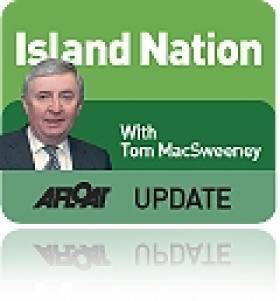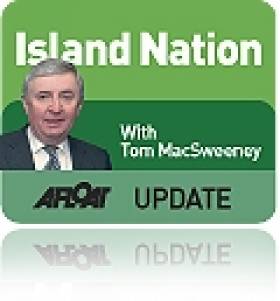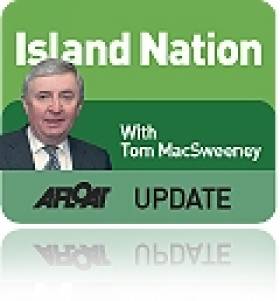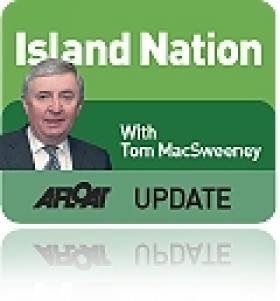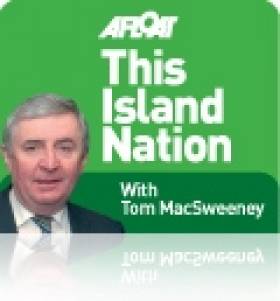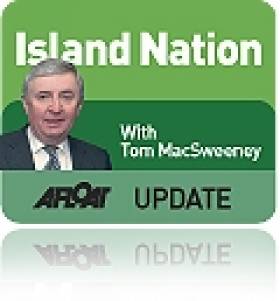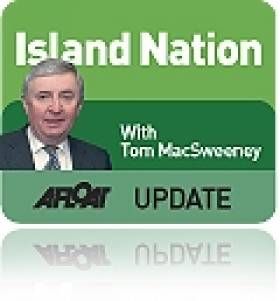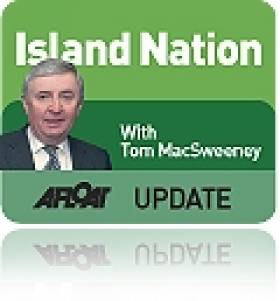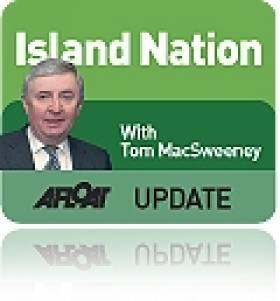Displaying items by tag: Tom MacSweeney
A Question Asked in a Kerry Boatyard
#islandnation – "Now, why would you say that Tom?"
And when Fionán Murphy rightly challenged me about my question, I did ask myself why I had just said:
"It's unusual, isn't it, for a boat for Norway to be built in Kerry?"
"I don't know why you would say Kerry, Tom," Fionán said back to me. "Ireland maybe, but why would you say 'Kerry'? The guy involved found us, came over to us and we have a fantastic relationship with him. He has been here for two months and he will be here with us until the boat is finished. It is a great place to do business because the Norwegian currency is very strong. To do anything in Norway costs a fortune, so they are getting great value for money here and we are still getting a good price for our product. It is a great place to do business and if we can do more business there, it will be fantastic."
It was a bright exchange which I enjoyed, because it is good for an interviewer to be challenged. I was trained in radio broadcasting in the days when the interviewee was the most important person, not the interviewer. Too much of radio now centres on the personality of the programme presenter, not the interviewee. I still believe that the interviewee is the most important part of an interview, so Fionán and myself chuckled at my gaffe and as Managing Director and the man who owns Murphy Marine Services on the Shore Road in Valentia Island and so an islander, he made a strong point about Kerry and the importance of our offshore islands. I was talking with him and other members of the island community who were making the point that the Government does not show enough commitment to Ireland's offshore islands. I interviewed Fionán about the future of the island and how his boatyard, which builds, maintains and stores boats, is going.
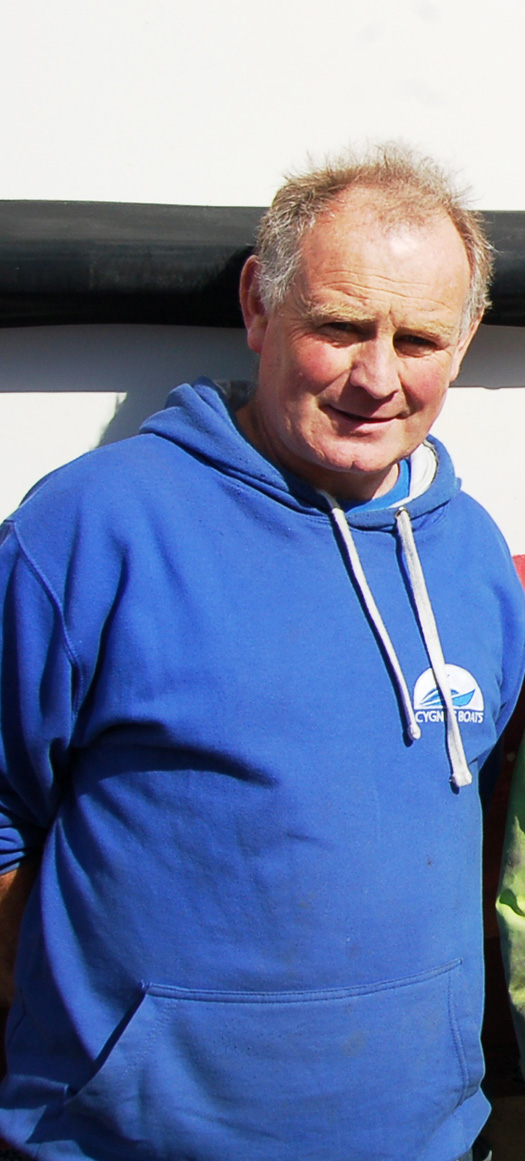
Fionán Murphy of Murphy Marine Services, Valentia Island
"Our predominant thing is new builds. If we get four-to-five of those a year we would be very happy. This keeps jobs on the island and that is what we need."
Fionán is also Chairman of the island's Development Company:
"Rural Ireland is in decline and we are doing what we can, but the island needs people and people need jobs to stay here. Islands need special recognition from the Government."
Fionán tells me in the interview, which you can hear here, how he started the yard fourteen years ago and how it has developed to its present stage of building boats which are sold all over Europe and how he overcame the economic, recessionary downturn.
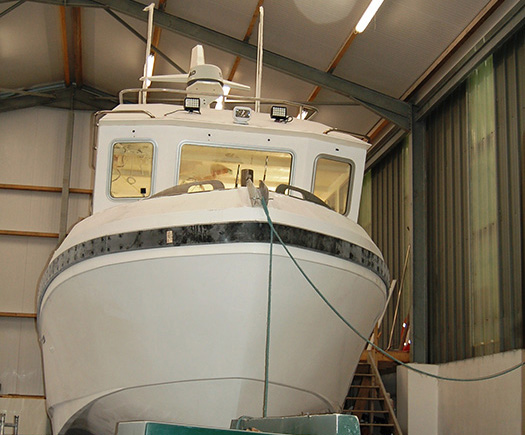
A new fishing vessel built in Valentia and bound for Norway
You can hear him on this current edition of THIS ISLAND NATION, Ireland's niche maritime programme, now broadcast on seven radio stations around the country and on this website. Also on the programme, the value of maritime safety training is emphasised by the interim Chief Executive of Bord Iascaigh Mhara, Michael Keatinge, who outlines how three fishermen's lives were saved when their boat capsized off the East Coast, because they had done the BIM safety course.
There's a lot more to be heard on THIS ISLAND NATION and you can Email me direct about the programme to: [email protected] or leave a comment below.
Jimmy Tyrrell – An Arklow Maritime Legend
#arklow legend – We are fortunate in this country to have people who are dedicated to the marine sphere and who give freely and willingly of their time and efforts in pursuit of their belief that maritime matters really should matter to the national community.
Jimmy Tyrell from Arklow is such a man. I have known and respected him through his work for the lifeboats for many years.
The RNLI has a proud history of over 190 years and the port of Arklow in County Wicklow, a town founded by the Vikings in the 9th century, lays claim to being the first lifeboat station established in Ireland, back in 1826. Jimmy Tyrrell has led lifeboat operations there for 46 years. His family is legendary in maritime matters.
Twenty-seven years ago Jimmy made a decision. The RNLI named its different classes of boat designs after rivers, but had never used the name of an Irish river. Jimmy was determined to change that and being a determined man, he achieved his goal. So when the new Shannon Class was born, the most modern vessel in the RNLI fleet and the first into Ireland arrived at the Lough Swilly Station at Buncrana in County Donegal, Jimmy was there to see it.
It was a great day for Jimmy, well-deserved and he describes his feeling as he saw the boat arrive on this edition of THIS ISLAND NATION.
When Jimmy retired from RNLI duties in Arklow another member of that great maritime family stood up to take over from him and continue the family association, John Tyrrell, who is now Lifeboat Operations Manager there.
The new Shannon lifeboat at Lough Swilly cost €2.4m and was designed by a Derry man who works for the RNLI at its Poole headquarters. It uses twin waterjets instead of propellers, giving it more manoeuvrability and the ability to operate in shallow waters. The man who designed it is Peter Eyre and he was once saved by the lifeboat service when he got into difficulty on the water, the story of which he tells also on the current edition of THIS ISLAND NATION.
When the RNLI describes a boat as "all-weather..." they mean it, the service always responds to calls for help, even in the worst of sea conditions, so the crews deserve the best boats. The Shannon has a top speed of 25 knots, a range of 250 nautical miles and a unique hull to minimise slamming of the boat in heavy seas, with shock-absorbing seats to protect the crew from impact when powering through the waves. The Lough Swilly lifeboat has been largely funded through a legacy from Derek Jim Bullivant of Bewdley, Worcestershire, in the UK who died in September of 2011.and is named Derek Bullivant. Coxswain, Mark Bennett, commands it and was welcomed by a huge crowd when he and his crew brought the boat from Poole to Buncrana. He tells us how it was an emotional day for him.
BASS BAN
This edition of Ireland's niche maritime programme also has an interesting story about supermarket advertising which can mislead purchasers into thinking they are buying Irish bass when it is illegal to catch them for commercial purposes in Irish waters, where such fishing is banned. So why are the public misled by advertising which says "Irish produced bass" when they come from fish farms abroad?
David Stanton, the Fine Gael TD for Cork East interested – and somewhat pleasantly surprised me – by making an issue of the lack of Government and State attention to the marine sphere. It's not often, I put to him, that a politician is heard to draw attention to maritime matters. He has a good point -that there is no single, central point in the State system, no 'one-stop-shop,' where all maritime enquiries can be dealt with, so anyone proposing a project can be sent from one section of the State services to another so many times they could meet themselves coming back. He is worth listening to and I'll be looking forward to hearing how the self-imposed mission he has declared, to highlight maritime affairs at Government level, gets on.
The island communities join the programme with a regular report, in which we hear why €60,000 a year, not a huge sum of money, is vital to education on the islands.
A lot then, about maritime matters which you can hear THIS ISLAND NATION by clicking on the programme icon above
Your comments are welcome below.
Difficult Waters for Irish Sailing, Just 17,000 Registered Leisure Sailors in Ireland
#irishsailing – There are just 17,000 registered leisure sailors in Ireland at present. There has been a decline in sailing, the level of activity has weakened, clubs are losing membership and several marinas have space available for the first time.
The only official participation figure available is for those 17,000 members of clubs registered with the Irish Sailing Association. There are many more sailors who own boats and use them outside of the club structures, so the actual participation levels could be two or three times that number. But there is no doubt about the decline in activity in the sport. The effects of the economic recession, people having less disposable income, loss of jobs, emigration, have all had their effects.
Brian Craig, one of the Directors of the ISA discusses the challenges facing the sport in a frank and direct interview on the current edition of THIS ISLAND NATION, the niche maritime radio programme, which you can hear here. The interview ranges across the still-present perception of the sport as 'elitist' and the methods needed to change this and to increase involvement in the sport.
"There is still a strong core foundation to the sport," Brian Craig says in the interview which discusses the Strategic Plan the Association has drawn up and which has been considered at meetings of ISA members around the country.
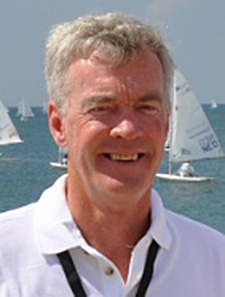
Brian Craig
The plan will be put before the ISA annual general meeting in Portlaoise on March 28 for adoption.
GOVERNMENT THINKS THERE IS AN IRISH LANDBRIDGE!
"We are a funny country. We are surrounded by water. We have a Government that thinks there is a landbridge somewhere, but they don't know where it is."
That was the comment of former seafarer Tom O'Mahony when he spoke to the programme at the annual Remembrance Ceremony for those lost at sea in the town of Youghal on the East Cork coastline. It is a coastal town with a great schooner tradition and memories of seafarers who ranged from the River Blackwater onto the world's oceans in various types of vessels. It is also where the programme is compiled, edited, recorded and transmitted every Monday fortnight at 6.30 p.m. and later each fortnight on Near FM in Dublin, Dundalk FM, Dublin South FM and Raidio Corca Baiscinn in County Clare as well as on this website.
Tom O'Mahony said there was a lack of maritime awareness at Government level and recalled the closure of Irish Shipping and the manner in which ships and crews were stranded overseas and men later left without pensions. "And that was company in which seafarers had gone to sea in ships that would not now pass maritime safety requirements."
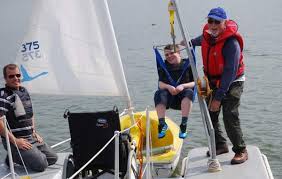
DISABLED SAILING
The RNLI describes a very courageous disabled sailor on the programme in contrast to the decision of the Paralympics Committee to discard sailing from its programme.
NO PLACE FOR BEING POSH OR A FIGUREHEAD
Also discussed on THIS ISLAND NATION is the use of nautical descriptions in everyday language, such as 'posh,' being a 'figurehead' and 'flogging a dead horse."
#drowning – The Chief Executive of Irish Water Safety, John Leech, shocked me this week when I heard him say at the end of his regular report on my radio programme 'THIS ISLAND NATION':
"I finish on a sad note, that it looks like we have lost ten of our citizens to drowning in the first month of this year, the majority of which appear to be through self-harm."
John, who formerly served with the Irish Navy and is a qualified diver, a tough discipline in which to qualify for underwater work, is also a sailor and a man I have known and respected for many years for his dedicated commitment to water safety. He has driven forward the need to wear lifejackets on boats, for fishermen and other aspects of safety on the water. And his work, leading that of Irish Water Safety, has had an effect. There is now, for example, much more wearing of lifejackets during yacht racing. I have noticed this over recent years and insist upon it on my own boat and, of course, lifejackets should be worn aboard boats of all kinds.
Referring to the drownings during January this year, of which I had not been aware until he revealed the information, John Leech added:
"To help reduce these drownings we need people to complete the HSE Safe Talk of Assist Course, which I have completed myself and recommend highly. Essentially it is a First Aid Course in suicide prevention."
During his report he also said that the Bulgarian Government has made water safety mandatory in their schools, "whilst Ireland has it on the Curriculum, regrettably not enough schools are teaching it."
Among the other facts he revealed:
• Drowning claims the lives of 372,000 people globally each year and is among the ten leading causes of death for children and young people.
• Over half of all drowning deaths are among those aged under 25 years
There are several other surprising facts about drowning and water safety which he discusses in his report which you can hear here.
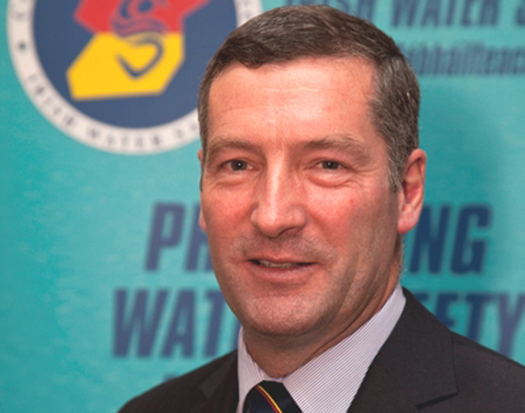
John Leech IWS CEO
EU RECOGNISES CRUISE SHIP INDUSTRY
"The industry has not got the recognition from the EU which it should, even though it has been around for 25 years," Capt. Michael McCarthy tells me on the programme when he talks about the cruise ship industry and says that recognition appears to, at last, be coming with the scheduling of a conference in Brussels on March 5 and 6.
"This has been sought by all cruise organisations. It will bring together those involved - shipping lines, ports, national and local tourism interests. There is a huge amount of potential in jobs and supplying the industry. Most of the cruise ships which are being constructed and 30 are due in the next four or five years, including mega ships, are being built at four shipyards in Europe. Then there is the tourism sector, ports, logistics, a multi-billion Euro potential, so it is time the EU recognised this," says Capt. McCarthy who is Cork Port's Commercial Manager.
He also speaks about Cork Port's cruise berth facilities at Cobh which are being extended: "To stay at the forefront, we have expanded as the industry has developed."
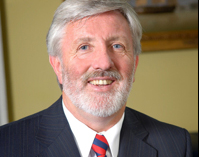
Capt. McCarthy, Cork Port's Commercial Manager
Work has started on putting in new bollards at the Cobh cruise ship berth at a cost over €1.4m. Cork is the only port in Ireland which can dock the last four generations of cruise ships, any of the new ships built since 2008/2009, any ships over 300-metres cannot berth in any other port in Ireland, he says in the interview which can be heard here.
The Relationship of Ireland to the Sea
#islandnation – "There is a deep-rooted interest in the sea amongst Irish people. Seeing history through the prism of the sea, bringing together the coastal communities and the public generally will raise interest in the relationship of Ireland to the sea," says Dr.John Borgonovo, Professsor of History at University College, Cork, in this edition of the fortnightly THIS ISLAND NATION radio programme.
The programme is presented by maritime journalist, Tom MacSweeney, and will also hear well-known Galway sailor, John Killeen, talk about the need and importance for the public service to serve the maritime community in the development of marine facilties throughout the coastal regions.
There will also be a report from the first time-ever holding of the International Lifesaving Conference in Ireland, which will be held in Dublin, maritime news from Ireland and overseas and music of the sea.
Harnessing Our Ocean Wealth: Understand Backwards – Look Forwards
#islandnation – "Life can only be understood backwards, but it must be lived forwards."
It was Søren Aabye Kierkegaard, a 19th century Danish philosopher and theologian, who penned those words. His approach to philosophy was to leave the reader of his words to discover the meaning.
The philosophical approach of Kierkegaard relates in my thoughts to the State attitude towards the maritime sphere. Without seafarers and the sea this island nation could not survive. That fact appears to still elude the understanding of many in Government administration. Looking backwards, I appreciate the launch in mid-year of the Government's plan for the development of the maritime sector when Enda Kenny said:
"As Taoiseach, I want to see us reconnect to the sea in a way that harnesses the ideas, innovation and knowledge of all our people, at home and abroad. I want to see us setting out to secure for ourselves and our children the social, cultural and economic benefits that our marine assets can deliver."
Encouraging words at the announcement of the Government's integrated marine plan for Ireland – "HARNESSING OUR OCEAN WEALTH".
But, as Kierkeggard, said: "life must be lived forwards..." so I wait to discover what the Taoiseach meant by those words and to see how the plan is developed into 2015.
Reflection and resolution are traditional at this time of the year, so in pursuance of the thinking of Kierkegaard I reflect on my first year of broadcasting outside of the State service, an experience which has been interesting and which has underlined to me the importance of developing community, by co-operation, through opinion and action. From starting with just one radio station there are now four broadcasting THIS ISLAND NATION fortnightly, in Cork, Dublin and Clare and with, hopefully, more to join "the family of the sea" in the year ahead and two websites, including Afloat.ie
This edition of THIS ISLAND NATION looks back at some of the community-based stories broadcast in the past year.
Fair sailing into the New Year...
Do Boats Talk?
#islandnation – I have told my wife that my boat is not an inanimate object, that it does talk to me, which has generated the response that it costs enough, but does it ever explain why?
It may not be capable of vocal expression in terms of the delivery of a voice message, I have responded, but it certainly has an audio capability and a 'feel' to it, which lets me know when she (referring to my boat again) is unhappy with her situation, or the demands which I am making upon her.
When advancing this view to my wife in discussion, it has had less than a positive response and other people, perhaps not of a maritime vintage, do not accept my view that boats can talk, but I remain convinced that boats can and do talk in a particular manner. In the current edition of THIS ISLAND NATION which you can hear here, I am in discussion with Sean Walsh, President of the Old Gaffers' Association, about the love of boats and he tells me that he would not part with his beloved gaffer, Tir na nÓg of Howth.
"I sailed on a gaffer and I found the experience so extraordinary when I sailed on it for eleven years and then bought it and have sailed it for 22 years. My boat is a Falmouth Oyster and she is magnificent. These old gaffers were built for working fishermen and they fulfilled that brief perfectly in the same way as the Galway hookers fulfilled their brief," Sean told me when I interviewed him at one of those great locations for gatherings of the old gaffer, the Poolbeg Yacht and Boat Club in Ringsend, one of the great maritime locations of Dublin..
"Their sea kindliness, their ability, their composure in bad weather and a bad sea is, I found, totally extraordinary and I had never experienced anything like it and they look so bewitchingly beautiful in their full rig with a topsail and mainsail and I was bewitched when I first sailed on an old gaffer and I still am.
"I have been sailing Tir na nÓg of Howth for 22 years now and can never see myself sailing another boat."
There speaks a man who loves his boat.
Ah, if only old boats could talk, but there are sailors and owners, myself included, who believe that boats are not totally inanimate objects, but have a life and can, in their own way, talk to you at sea, letting you know how they feel as they cope with conditions.
What do you think – do boats talk?
John Hollahan accompanies the interview, singing 'If old Boats Could Talk'...
but perhaps they do, at least to some people..... me included.
The song is from the CD 'Songs for The River Men' which was compiled by the local community along the Suir Estuary when the three Bolger brothers, Paul, Kenny and Shane from Passage East in Co Waterford died after their 19ft fishing boat capsized outside Tramore Bay in June of last year. Paul, 49, was a father-of-one, his 44-year-old brother Shane had two young children and their 47-year-old brother Kenny was a single man.
On the programme you can also hear why tyres from a factory which closed down over 30 years ago are arriving on East Cork beaches and why the first-ever Christmas sea swim for charity, which started the tradition, will not be held this year.
The theme tune of THIS ISLAND NATION is 'Sailing By,' with which I led my maritime programme, SEASCAPES, on RTE for over 20 years. Now it sails on new airwaves. I hope you enjoy the programme.
Fair sailing
Seascapes On RTE Radio 1 Has Much To Celebrate After 25 Years
#seascapes – The maritime community in Ireland is a mystery to the vast majority of the rest of the population. Admittedly anyone Irish will sing enthusiastically about how good it is to be entirely surrounded by water. But for most folk among a people who like to think that they're basically rural even if the reality is they're increasingly urban, the sea is seen as no more than a useful barrier, while the coast is only briefly a fun place at the very height of a good summer.
The sea and the coastal interface are not seen as an exciting world in itself, a unique environment which deserves to be explored, enjoyed and utilised in practical and often beneficial ways. On the contrary, the popular view of the plain people of Ireland is that the less they know about the sea, the better. And the unspoken corollary of this is that anyone who seeks to go to sea for recreation is at best a bit odd, maybe even a misfit ashore, while those who work on the sea only do so because they couldn't get a job on land.
Here at Afloat.ie, in its various manifestations over the past 52 years, we've been trying to spread mutual understanding and useful information among the many and varied strands of those who go afloat for sport and recreation in Ireland and beyond. We know this is largely a matter of preaching to the converted. But we also try to do our bit to welcome those who may be newcomers to the world of boats, while remaining keenly aware of the drawbacks of over-selling our sport, our hobby – our obsession, if you wish.
Sailing and boating in Ireland can be rugged enough. Thus the sport in all its forms can only expand in a sustainable way if it attracts people who will themselves bring something positive to the party, for interacting usefully with boats is not a passive affair. And there has been a certain level of success. Over the years, while there was an understandable blip in boating numbers during the recent recession, the graph has been reasonably healthy when it's remembered that rival sport and entertainment attractions are proliferating all the time, while the increasing availability of holidays afloat in sunnier climates makes the promotion of boating activity within Ireland more problematic.
Fifty-two years ago, beginning a process of regular communication among Ireland's recreational boating community was quite a challenge. But it was a very straightforward project compared with inaugurating a regularly weekly broadcast maritime programme for all listeners on national radio in a country notably averse to the sea. Yet it all began 25 years ago, and it's still going strong.
So how do you celebrate 25 years of a niche radio programme, a little Irish maritime magazine of the air? It would be too much to expect a documentary on primetime television. And even an extra-long gala edition on the national radio airwaves at peak listening times might well be counter-productive. So it seems the answer is that the best way to celebrate 25 years of Seascapes on RTE Radio 1 is to publish a book well-filled with some of the key broadcasts with which it has been associated. And as those now-printed broadcasts include a maritime-themed series of the prestigious Thomas Davis Lectures, you mark the anniversary by sending out those as broadcasts again in their own right twelve years after their first transmission.
It may all sound almost devious, a matter of managing to slip the Seascapes celebrations in under the RTE management radar. But those of us who have been banging the maritime development drums for a very long time are well aware that, though the tide is definitely turning, there's still a huge underlying resistance to anything to do with the sea and boats, and it takes an element of cunning to get the message across such that, in time, the people are themselves singing from the same hymn sheet, and thinking it was all their idea in the first place.
But the founder of Seascapes 25 years ago, RTE's Cork reporter Tom MacSweeney, makes your average terrier look like a tired old dog. A sailing and maritime enthusiast himself even though his family had been from a non-maritime background, he had as a child in Cork been inspired by his grandfather's great respect for seafarers, and the vital task they performed in keeping Ireland connected with the rest of the world. He could see the sea all about us, and Cork is the most maritime of cities. So he just kept nagging RTE until they gave him a quarter of an hour once a week back in 1989 to put on a maritime programme for an island nation. And though it has been shifted around in the schedules, it is now a solid half hour every Friday night at 10.30pm, a worthy fulfilment of RTE's public service remit - you really do get a sense of Seascape's nationwide listening community, while podcasts make it more accessible than ever.
The sheer volume of material from all round Ireland's coasts, from our lakes and rivers, and from Irish seafarers abroad, is simply monumental, a treasure trove. So in producing the book (it's published by Liffey Press at €20 with all royalties going to the Lifeboat Service), they'd to wield a fierce scalpel. And though it includes the complete set of Thomas Davis lectures from twelve years ago, it's still of manageable size (in other words, you can read it in bed), while giving a good overview and flavour of the kind of material Seascapes broadcasts, and what we might call the house style.
In Tom MacSweeney's days of producing and presenting it from 1989 until he retired from RTE in January 2010, it has to be agreed that very occasionally the nagging which got Seascapes its slot in the first place sometimes spilled over onto the airwaves in the programme itself. Okay, we all know that Ireland is not as sea-minded as it might be. But things are slowly improving in this, and they might improve more quickly if the maritime movement relied more on the path of gentle encouragement and inspiring example rather than constantly reiterating the tedious refrain of "the government should do this, the government should do that....."
From time to time, I have to confess I thought the worst possible thing was to get the government involved at all, having seen what the official encouragement and enforcement of the Irish language had achieved since the establishment of the state. There'd be occasions when you'd think the best way to turn the Irish into a nation of doughty sailors would be to declare seafaring illegal. The people would have taken to boats in their droves....But nevertheless the tide is slowly but definitely turning, and in today's less frenetic atmosphere of businesslike maritime promotion and development, we're becoming more comfortable in our relationship with the sea.
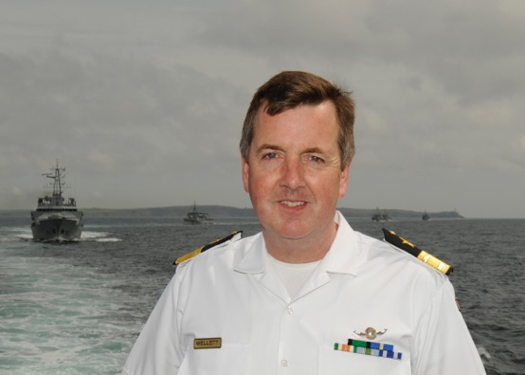
Man of the sea. Rear Admiral Mark Mellett DSM on exercises with the Naval Service off the Cork coast.
So it was entirely appropriate that, in the launching of the Seascape's compendium Sailing By, the main speaker in both the Cork Harbour Commissioners' building on the Friday night (November 28th), and in the National Maritime Museum in Dun Laoghaire on Monday, was Rear Admiral Mark Mellett DSM, our most distinguished navy man, who has risen to the august heights of Deputy Chief of Staff of the Defence Forces.
If you requested Central Casting to provide an Irish Admiral who conveys the expected air of competence with the necessary gravitas and presence, while still having that essential Irish twinkle, then they'd send you Mark Mellett. We'd most of us heard of his steady rise through the senior ranks, but for many of us in the National Maritime Museum on a damp December night, it was the first experience of seeing Admiral Mellett in a professional and public capacity. For people from a very wide range of interests and activities in the maritime sphere, it was very encouraging – we feel we now have a spokesman who can ably represent us at every level, however formal or high powered, while at the same time retaining the human touch.
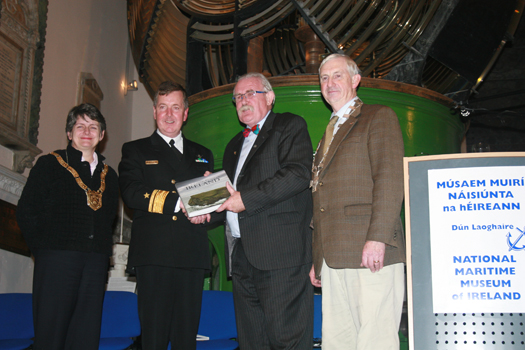
Top people at the launching of the Seascapes book Sailing By are (left to right) Cllr Marie Baker (Cathaoirleach of Dun Laoghaire-Rathdown County Council), Rear Admiral Mark Mellett DSM (Deputy Chief of Staff , Defence Forces), Marcus Connaughton of Seascapes, and Richard McCormick, President of the National Maritime Museum. Admiral Mellett is being presented with the book The Atlantic Coast of Ireland, as he already has his own copy of Sailing By – he wrote the foreword.
His enthusiasm is palpable, and he provided a foreword for the book which speaks from the heart, yet provides a practical and businesslike outlook. In fact, that was the flavour of the evening in the National Maritime Museum, as it was hosted by Richard McCormick, the recently elected President of the National Maritime Museum, and the speakers included the Cathaoirleach of Dun Laoghaire-Rathdown County Council, Cllr. Marie Baker, and Tom McGuire, head of RTE Radio 1, who knows better than anyone just what has been needed to keep Seascapes on the airwaves for 25 years.
Most of all it has of course been the sheer dogged determination of Tom MacSweeney working on his own as producer and presenter in RTE's Cork studio, followed by his successor Marcus Connaughton, who came in as producer when the Thomas Davis Lectures were added to an already almost impossibly demanding schedule in 2002, and stayed on to become presenter eight years later.
They're two very different people. Tom is so involved and enthusiastic that occasionally his own personality, opinions and attitudes cloud the issue. He's a complex man with many interests, not least of them being a national Vice President of the St Vincent de Paul Society. But as regular visitors to Afloat.ie will know, he continues to broadcast his own maritime programmes through community radio, and he's a much-sought-after speaker on sea matters. Recently, he gave a sold-out talk - How Stands Our Island Nation? - to the Dublin Bay Old Gaffers Association in the Poolbeg Y&BC, and while he had the usual serious message, it was leavened by his sharp wit, with the laugh of the evening being provided by his reading of the pained official letter from an Irish Lights Manager complaining about the sheer incompetence and slovenly carelessness of Brendan Behan when he was employed as a painter renovating the St John's Point lighthouse in County Down.
That said, it was a telling lesson in the importance or otherwise of maritime affairs in Ireland's national and cultural life in times past, that the story of a noted playwright making a complete hames of painting a lighthouse was something you knew would register more readily with a general audience than anything of more direct nautical interest, and it is an awareness of the need to reach out gently to the general public which sets the tone of Marcus Connaughton's presentation of Seascapes.
He arrived in the job first as producer, and then as producer/presenter, with no personal baggage in maritime matters. His background was in music production and public relations, and a couple of years ago he brought seventeen years of research and writing to a successful conclusion with the defining biography of Rory Gallagher. But gradually he has become absorbed in and intrigued by the world of boats and the sea. As one of the speakers on Monday night put it, one of the most quietly impressive peformances you'll see is Marcus – who is by no means a small man – sidling into the crowd at some maritime gathering, armed with microphone and recorder, ready and willing to give a voice to the voiceless.
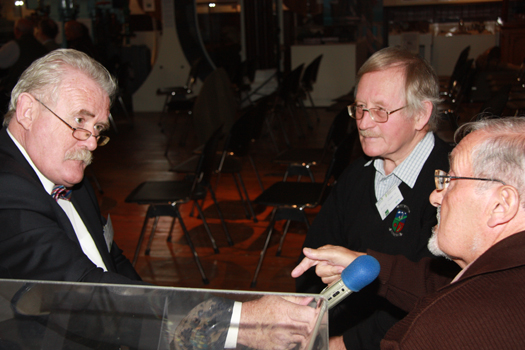
Man at work – Marcus Connaughton records the memories of Alan Martin and Jimmy Carthy of the Dublin Dockworkers Preservation Society
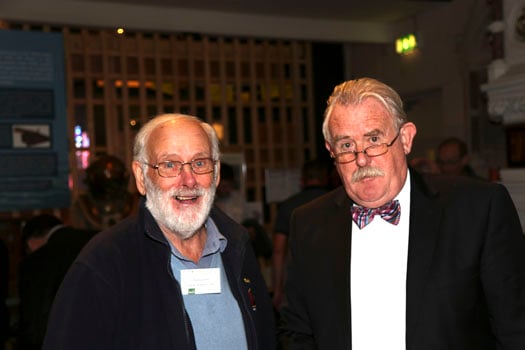
Tim Magennis (left) President of the Dublin Bay Old Gaffers Association, with Marcus Connaughton. Once upon a time, they were work colleagues in the PR Department of Bord Failte
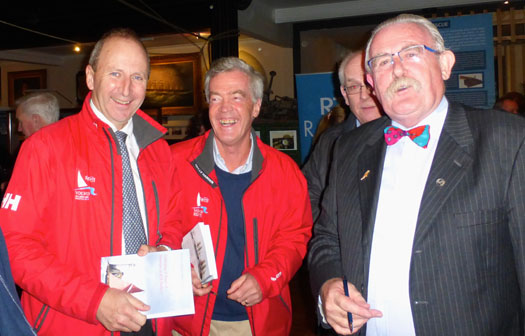
The book launch begins to become a party – Con Murphy of the National YC (left) and Brian Craig of the Royal St George YC getting their copies of Sailing By signed by Marcus Connaughton in the National Maritime Museum. Photo: W M Nixon
The changeover to a new presenter was fairly gradual, but very marked in one thing – he changed the signature tune. When Seascapes started in 1989, they simply borrowed the music which precedes the BBC Shipping Forecast, Ronald Binge's "Sailing By".
"Sailing By" in almost any form is the sound of syrup being poured over sugar lumps, but some folk loved it, so the change to the brisk tone of Simon Mayer's The Reel Thing wasn't universally popular, even if welcomed by those of us trying to cut down on the sucrose.
Yet it's surely an appropriate 25th anniversary sweetener that the published compendium of Seascapes stories is titled Sailing By, and the cover is a fine photo of the renowned pilot cutter Jolie Brise sailing by the Fastnet Rock. It was taken by Brian Carlin of Tralee, who subsequently went on to be the award-winning photographer aboard the Volvo 65 Team Vestas, which unfortunately managed to do some excessive impactive navigation off Mauritius during the Volvo World race last weekend. It was certainly not the photographer's fault, but it heightened the sense of an Irish maritime community worldwide that at Monday night's gathering, Marcus was able to tell us that not only was Brian all right, but that in contacting his father to say so, he requested that the message be passed on to Seascapes as soon as possible.
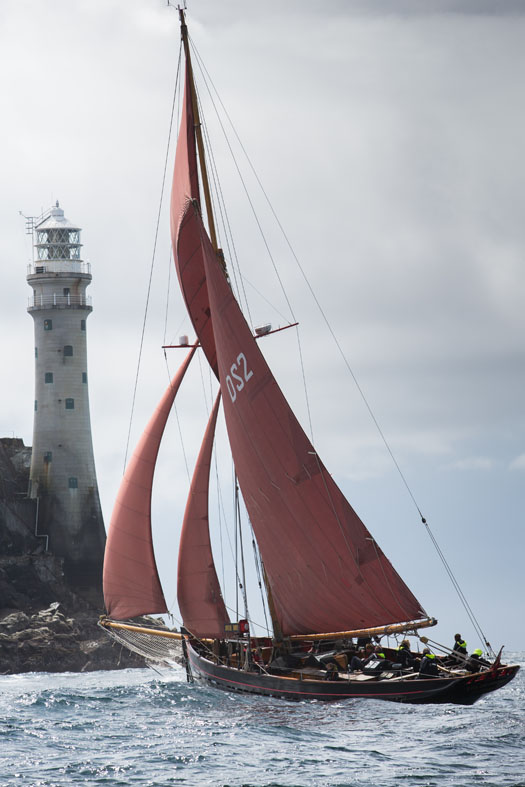
One of award-winning photographer Brian Carlin's studies of Jolie Brise sailing by the Fastnet Rock. Photo: Brian Carlin
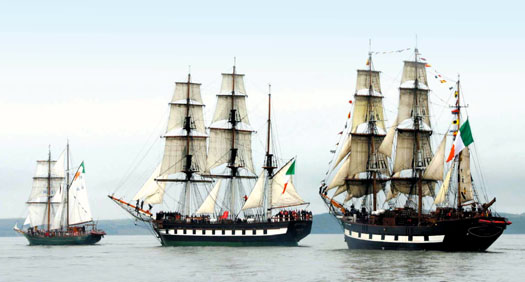
The top moment – it's 2005, and the Seascapes team are on board Asgard II as she leads the Dunbrody of New Ross, and the Jeanie Johnston of Tralee, in the Parade of Sail at the Tall Ships visit to Waterford. Photo: Dave Osborne
As for Marcus's own special recollections of his years with Seascapes, we allowed him six and he ranked them: (1) Being on Asgard II in Waterford with the Tall Ships in 2005, (2) at sea off Hook Head with Martin Colfer amidst enormous schools of lively dolphins, (3) in Galway during both Volvo visits, (4) being far up his beloved Munster Blackwater beyond Ballinatray at the top of the tide, (5) celebrating 25 years of the Killybegs Fishermen's Association at a monster party in the great Donegal port, and (6) being in the renovated National Maritime Museum in Dun Laoghaire when it was re-opened by President Michael D Higgins.
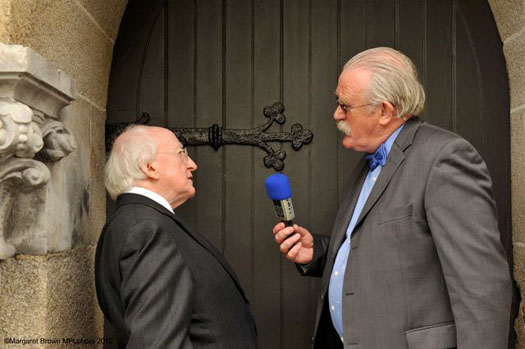
Presidential thoughts of the sea and seafaring in Ireland – Seascapes interviews President Higgins after he has re-opened the restored National Maritime Museum in Dun Laoghaire. Photo: Margaret Brown
Seascapes was of course broadcast as usual last night at 10.30pm, and Marcus Connaughton will be signing copies of Sailing By in Waterstones in Cork this afternoon from 2.0pm to 5.0pm. The first of the six Thomas Davis lectures from 20012 – Paddy Barry's lyrical account of sailing round Ireland – will be broadcast on Friday December 19th, and they'll continue weekly until the final one on February 6th, which is my own item about why most people in Ireland think sailing enthusiasts are so odd. As mentioned at the Glandore Summer School in July, I've changed my mind about some aspects of that, and I'll probably have changed it yet again when Marcus provides me with the space for further thoughts on the matter on Seascapes some time after February 6th.
But meanwhile, happy birthday to Seascapes – you provide a wonderful example of genuine public service broadcasting.
Island Communities Speak Out Against Government Policy
#islandnation – On this edition of THIS ISLAND NATION podcast I question Government policy towards two aspects of the marine sphere and ask how much confidence can be placed in the much-hyped plan to create Ocean Wealth writes Tom MacSweeney.
Several times the operation of Howth Harbour in County Dublin has been raised with me and on the programme I interview a young marine engineer who claims that the Department of the Marine has, for the past three years, been obstructing his attempts to start a marine engineering repair business there which could create jobs. But, the Department doesn't want such a facility in Howth, he claims. So what is the reality of the Government's promise to create more maritime jobs, if the Department responsible for the marine sphere is not in tune with that plan?
Add to all of that the situation in which nine offshore islands, which don't speak Irish, find that the Minister for the Environment has decided to cut off funding for community development offices on the islands and you might just wonder what is going on in this island nation? The money involved is €600,000 – not a lot in the context of overall Government spending and the Islands' Federation, the Chairman of which I talk to on the programme, maintains that the ending of support for the creation of jobs on the islands and the provision of other essential social and technological supports, could create depopulation on some of them, off the Cork and Western coastlines.
Such is the way aspects of the maritime sphere are being treated these days.
Women Of Dubious Morale Values, Sailors, Sex, 'Fish Wives & Smugglers
#islandnation – In the maritime context there are probably several answers to that question, varying from legal to illegal, to elements of sex for sale to sailors at ports around the world, interpretations of the life of the sailor with a 'girl in every port' and so on. There is also the derogatory term "fish wife," often cast around in arguments between husbands and wives.
The value of women in a maritime context is one of the subjects in this fortnight's edition of my radio programme, THIS ISLAND NATION, to which you can – and should – listen above. Jim McLaughlin from University College, Cork, questions the failure of maritime history to recognise women as an integral part of the fishing industry and to appreciate the role of fishermen's wives, such as the tough women of the Claddagh in Galway. He says they have been ignored. The Galwegian women were so good to their fishing husbands that they met the boats on arrival back from the fishing grounds, carried their men ashore from the vessels on their backs, then filleted the fish and sold the catch.
Now there are women of substance for you!
Joe Varley, a Dublin man who has done an extraordinary amount of research work on maritime history, adds in the programme that another aspect of maritime history which has been ignored is that of smuggling. Rush in North Dublin was a great place for it and there's smuggler's cave on the coastline between Loughshinney and Skerries which was used by Jack Connor, a 'romantic and swashbuckling character' who was popular in then 'high society,' according to description and it contains treasure he stole. It is reputed to be guarded by a green serpent, but has never been properly located. Anyone with information, let me know please!
On the programme too you will hear beautiful music and song of the sea performed by the fishermen and fisherwomen of Newfoundland and Labrador, 'fish wives' certainly, but of a highly respectable and dedicated kind. They are part of a group which has toured the world called "Sea People," formed after the Newfoundland cod fishery collapsed in the mid-90s and who dedicated themselves to keeping alive the memory and traditions of the sea.
Those are the kind of people we need. Listen to them here and enjoy the sound of the sea.
Until next week, the usual wish of ..... "fair sailing" ........



























